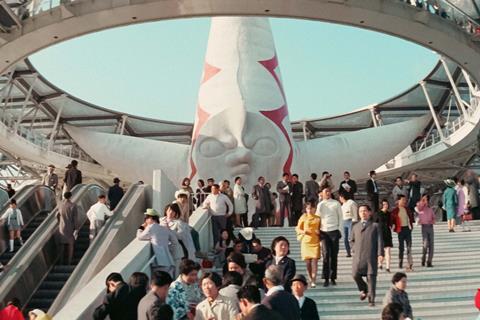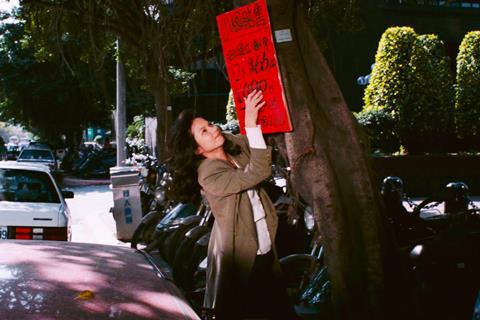
Classic Taiwanese films are being given a new lease of life, meticulously restored by Taiwan Film & Audiovisual Institute (TFAI).
One of the latest to be given the restoration treatment is Tsai Ming Liang’s Vive L’Amour, which won the Golden Lion at Venice Film Festival in 1994 and made its return to the Lido this year. A 4K version of the acclaimed drama had its world premiere as part of the Venice Classics selection, attended by director Tsai alongside lead actor Lee Kang Sheng.
The urban tale follows three lonely souls in search of intimacy and warmth, capturing the loneliness of the people in Taipei in the 1990s. It was the second feature directed by Tsai, who went on to win a further grand jury prize at Venice with Stray Dogs in 2013.
As Vive L’Amour turned 30 last year, TFAI embarked on the restoration after approval from Tsai. TFAI is the only government agency dedicated to the preservation and promotion of Taiwan’s cinematic cultural heritage.
“What is being restored is not just the image on film, but the soul and memory of an entire era,” says TFAI chairman Arthur Chu. “TFAI hopes that through the restoration and promotion of these classic works, the world will continue to witness the rich cultural depth and diverse influence of Taiwanese cinema.”
Since 2008, TFAI has scanned more than 7,000 films, collaborated on the restoration of 75 titles and completed more than 35 in-house restorations. Its extensive collection — comprising more than 20,000 film reels and nearly 400,000 audiovisual artefacts — is preserved in several vaults.
World tour

Classic cinema has become a major opportunity for international film festivals to rediscover hidden gems and bring old favourites back to the big screen and several Taiwanese classics restored by TFAI are touring the world this year.
Liao Hsiang-Hsiung’s Tracing To Expo ’70, freshly restored in 2K, was picked as the opening film of the 21st Osaka Asian Film Festival (OAFF) in Japan on August 29. The film features Taiwanese Japanese superstar Judy Ongg and returns to the big screen some 55 years after it was first released.
Director Liao’s extensive use of tracking shots merged documentary with fiction and guided the audience through the pavilions of different nations. The pioneering Taiwanese filmmaker was also a key figure in helping ease censorship while also working on the launch of filming subsidies when he was with the film department of the Government Information Office (GIO).
OAFF programming director Sozo Teruoka had been keen to introduce this film, which captured the sights and sounds of the first Osaka Expo, to Japanese audiences. He had almost given up hope as the original print was seriously damaged before TFAI chose to digitally restore the film to its former glory, and most significantly, in time for the 21st OAFF, which coincides with the Expo 2025 Osaka.
Hsu Chin-liang’s The Fellow Who Rejected College premiered in Singapore on August 20. This 2K version was restored by TFAI at the request of Singapore Film Society chairman Kenneth Tan after he contacted director Hsu. Tan says he watched this 1979 high-school film 43 times when it was first released in cinemas, connecting the story of a top student who decides not to take the college entrance exam with his own experience of academic pressure.
In April, Udine’s Far East Film Festival hosted a three-film tribute to director Pai Ching-jui, who studied film in Italy before returning to Taiwan to join Central Motion Picture Corporation in the 1960s. His restored heritage films comprise Lonely Seventeen, Accidental Trio and Good Bye! Darling.
Also in April, a season dedicated to Taiwan New Cinema curated by the British Film Institute included 1984’s Ah Fei, one of the key titles restored by TFAI. Director Wan Jen’s feature debut captures the harsh realities for women amid Taiwan’s rapid social changes. It was adapted from a short story by feminist writer Liao Hui-ying, who co-penned the screenplay with Taiwanese director Hou Hsiao-hsien.
Following the world premiere at Taipei Film Festival, Chang Mei-chun’s 2K-restored social satire Gorgeous held its international premiere at New York Asian Film Festival in July. The film was produced by actress/producer Hsu Feng.
Next year will mark the 70th anniversary of Taiwanese-language film. TFAI is set to restore some notable works of the 1960s, including Lee Hsing’s Good Neighbours, Shao Lo-hui’s Love Never Ceases and Hsu Sho-jen’s Zhang Di Seeks A-Zu.
Contact: Erica Lin, TFAI
Find out more: tfai.org.tw/en/



























